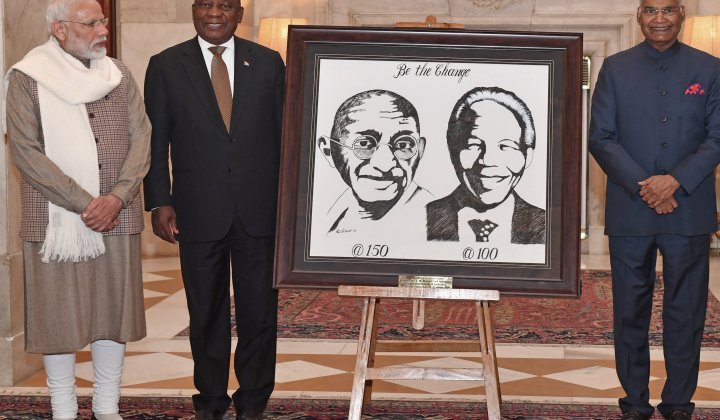From a "Doing business with China" perspective, you might be in retail and would like to procure directly, or you’re in commodities and would like to sell direct. Or you may not have cared much – until recently when your sales manager complained that Chinese competition is eating into your market share.
...have a healthy scepticism towards the figures on China.
In today’s business world, having a considered view on the Chinese market and developing a proactive strategy is non-negotiable. In this short article, I’d like to share some of my experiences working with Chinese, Western and South African businesses.
1. 外行看热闹 内行看门道 Waihang kan renao Neihang kan mendao
The layman looks at the hustle and bustle the expert looks at the methodology
As a consultant tasked with building an Africa-based, Chinese client portfolio for a global risk management consultancy many years ago, I made a call on a representative of a Chinese state equity fund manager in Johannesburg. Armed with brochures and fresh from online sales training, I had hoped to interest the prospect on my array of risk-update subscriptions and bespoke reports.
As we had been introduced by a mutual friend – following the correct guanxi network (see below) – and as the investment project my prospect was responsible for was working out well, he was in a good mood and happy to chat. I duly recited my “elevator pitch” and then went through the range of services we offered. I then showed him what I had hoped would be the clincher: the latest statistics from the Chinese Ministry of Commerce, showing that 63% of Chinese cross-border M&A had failed – much higher than the western norm.
“63% failure? Where did you get your numbers?”
“Umm, it’s from your own Ministry of Commerce, sir. I can show you the report…”
“Nah, I don’t want to see the report. There’s no ways Chinese overseas M&A failures are 63%...”
He paused.
“They must be well over 90%…”
Working on the front lines of a Chinese state fund specialising in taking equity stakes in China-Africa JV deals, my prospect knew what he was talking about. Cross-border M&As are complicated at the best of times. Add to the mix state-owned Chinese partners, and you have a complicated stew of lost-in-translation, diverse business cultures, non-compatible regulatory requirements, and lengthy decision-making processes.
First and foremost, have a healthy scepticism towards the figures on China. China may be a large, growing economy, globally and in Africa, but doing business with its companies is complicated. If you decide to do business with Chinese partners, fully expect to get it wrong, many times. As my prospect had said, the real failure rate is upward of 90%.
2. 不打不相识 Buda bu xaigshi
From an exchange of blows friendship grows
A friend who works for a Fortune 500 Chinese infrastructure construction company calls me up. Their project in a Southern African country needs a steel railway bridge. The standards specified are South African and European, and this precludes Chinese steel fabricators from back home. To his surprise, steel fabricators in SA are not keen to give him proposals. In China, getting five or six proposals would be just a few phone calls. He tells me, “I’ve sent out the drawings. This is a very simple bridge. I just need a quote!”
Following up with suppliers on his behalf, the steel fabricators tell me that they need the precise scope of work, do site visits, then understand the construction team's capabilities. Without a guarantee they’ll get the job, they are not willing to provide proposals and quotations.
In China, civil engineering project work processes and systems are quite standardised. There is a tacit understanding, common practices and plenty of give-and-take between designers, construction teams and inspectors.
...every Chinese construction company advantage is blocked...
“Buda bu xiagshi,” my friend says, “Ask the steel fabricator to partner with us. We will iron out issues as we go along!”
My Chinese engineer friend feels that being a Fortune 500 Chinese contractor and a huge potential source of contracts, local suppliers should be scrambling to work for him. What he does not realise is, for medium-sized South African companies in a regulated industry, they don’t have the resources to do project proposals at risk. And to be told that they can “iron out issues as we go along” is just too far outside their comfort zone.
The culture gap in how different partners in a civil engineering project collaborate has meant that while many Chinese construction companies have become main contractors for major infrastructure projects, there are still few local African suppliers who win sub-contract work.
I have no easy answer here. I once asked the country manager of another Chinese state-owned construction company in Mozambique why he didn’t consider tendering in South Africa. He went on to give me a half-hour speech about how every Chinese construction company advantage is blocked. Chinese engineers – can’t get visas. Chinese 24/7 work ethic – labour unions, and health & safety. Chinese financing – South African Treasury won’t sign sovereign guarantees. Chinese materials – localisation supplier requirements.
3. 路遥知马力日久见人心 Luyao zhimali rijiu jianrenxin
As distance tests a horse’s strength so time reveals a person’s heart
The chasm to bridge between the two sides is business culture. Consider the civil engineering project example I just presented and realise that what you take for granted as a matter of course in your profession may impede working with a Chinese company. Similarly, how your Chinese counterpart has always worked his entire professional career may be considered ludicrous in Africa.
A problem with South Africans is that we take a transactional approach to deals and do not allow enough time for a trusted partnership to develop. As professionals, we tend to take it for granted that the Chinese partner should trust our professional standing. Similarly, Chinese prospects can be too suspicious of a foreigner and allow sound opportunities to escape.
While cultures may be different, what is universal is the importance of respect and trust. As you struggle with language and cultural differences, realise that you are in for the long haul and a great deal of trust is needed to make a success of cross-cultural ventures.
4. 买卖不成仁义在 Maimai bucheng renyizai
The deal may have failed but good faith remains
When I was a lecturer at a university in Shanghai, I took two friends, both of whom were professors at a London university, to see the sights after attending a conference that my university had organised. After the obligatory Xiaolongbao (steamed dumpling) restaurant, we went shopping at one of the Shanghai fake markets. At the fake market, you can get luxury brand watches, bags, clothes, and accessories at a fraction of the cost of the real thing. I was extremely impressed by the efficiency of the one professor who is originally from West Africa. Knowing he was visiting Shanghai, his daughters had emailed him the list of luxury bags, watches, and accessories they wanted their father to buy – complete with colour pictures and backup choices!
The two sides then practised the rituals of:
1. Asking for the price of the good (by pointing at the picture provided)
2. Shock at the high price!
3. Shock at questioning a price that is already the lowest in the whole market!
4. Repeat 2 and 3 a couple of times with the price coming down.
5. Breaking down of the negotiation and walk away.
6. Shopkeeper chasing down the aisle to say she is losing money on this deal, shouting or nearly in tears, and eagerly accepting the money.
While cultures may be different, what is universal is the importance of respect and trust.
At one point, the professor went back to a previous shop wanting to re-start the process, followed by the young lady shrieking in protest that he had already got her to the bottom price. This was followed by profuse apologies and a quick handover of the money.
Everyone knows this is a ritual and is an accepted process enabling strangers to build rapport and trust. The buyer feels that he has got the best deal possible. It would be missing the point for you to say this practice is dishonest and that shopkeepers should just list their prices. So, as you offer your goods and services to your Chinese partner, try not to judge her as cheap or dishonest for haggling with you on price or even wanting to walk away from the deal. It is a part of the process.
5. 海内存知己 天涯若比邻 Haineicunzhiji tianya ruobilin
Friendship makes the world smaller
Guanxi is sometimes translated as a relationship or connection(s), but it is more than that. Guanxi is about social capital within a group of friends, relatives, or associates. Soon after I started as the Chinese Key Account Manager at Barloworld Equipment, my colleagues were impressed that I was able to arrange a meeting with the executive team at a Chinese-owned mine, which was something they had struggled to do. However, it was not because of my ability to speak Mandarin that I was able to get the meeting – over a billion people speak Mandarin after all – it was because I was able to pull some guanxi.
I was able to call in a favour with a friend of mine who was both a senior executive at a Chinese bank in Johannesburg, as well as a leader in the South African Chinese community. He made the phone call to the mine to introduce me, and a meeting was respectfully and quickly arranged.
I had cultivated social capital and reputation in the Chinese communities, and this earned me access, trust, and assistance. Of course, I continue that practise today. My advice to you, as you look to work with Chinese partners, is to forget about quick wins and low hanging fruit and rather build friendships for the long term.
Dr. Steven Kuo is responsible for Chinese key accounts at Barloworld Equipment Southern Africa. A Research Associate at GIBS, he was formerly Africa political risk analyst at Control Risks.
He writes a fortnightly column for Business Day on international affairs. His articles on China and Africa have appeared in The Conversation, The Guardian (UK), Forbes (USA), Caixin (China) and The Paper (China).
He completed his PhD at the University of St. Andrews, Scotland.




